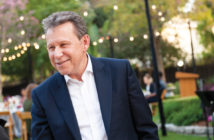As I looked through this issue of Och Tamale, I was struck that the editors had, by sheer coincidence, assembled stories on a mix of topics that have interested me deeply throughout my presidency. What did today’s future look like in 2012? As I mark my five-year anniversary with the U of R, this is an opportune moment to reflect on the foreseen and unforeseen challenges we have met together.
In my inaugural address, I envisioned a time when students would come to study the “reinvented liberal arts” and would step into a new University Village in Redlands. This future University would offer improved college affordability, digital media for the sake of learning, and a comprehensively internationalized experience. In this issue of Och Tamale, you can see how far we’ve come.
The cover story delves into how digital media have infused teaching and learning. From the “flipped” classroom to advanced spatial analytics and digital convergence of the arts, as I had hoped, faculty and students are seizing the creative and scholarly opportunities afforded by the digital age.
Also reported in this issue is North Star 2020—the University’s strategic plan collaboratively developed by faculty, students, administrators, staff, and trustees. Our plan includes key initiatives advancing affordability, such as the new regional memoranda of understanding guaranteeing admission and significant financial aid to qualified local high school and college transfer students.
As for internationalization, an interview with U of R Assistant Provost for Internationalization Steve Wuhs notes a significant increase in international students at the University, enhancing the University’s intellectual diversity and setting the stage for all our students to thrive as global citizens. I credit efforts by the faculty and administration for this growth, as well as the spirit of exploration of the international students who have chosen to join us.
Despite some successful predictions, I must admit I failed to foresee some prominent issues facing us today. Like most people in 2012, I did not anticipate our current climate of political divisiveness and challenges to civility. I also did not foresee that the explosion of digital technology would lead to problems involving “fake intimacy,” as well as “fake news.”
And the next five years? I have already ignored writer Alvin Toffler’s admonishment that, “No serious futurist deals in prediction. These are left for television oracles and newspaper astrologers.” Toffler could have added university presidents to his list. However, the future I see is already emerging: technology will continue to accelerate in unimaginable ways, and the University of Redlands will find new ways to thrive and prepare students to enter a rapidly changing world. That’s not boilerplate. We will have flying Uber cars, sensor monitors on our wrists, new insights into our microbiomes and genomes, and retina scan-protected privacy.
At the U of R, we will incorporate the best of online education—as the School of Continuing Studies is already doing and the Schools of Business and Education will expedite with online degree programs to launch beginning this September. Avoiding the lure of “faster, cheaper” classwork, online offerings will enable students to learn some curricula asynchronously, on their own schedules, especially in applied fields or disciplines with stable canons. Our faculty are playing a central role in shaping online content, pedagogical quality, and presentation style.
At the same time, Redlands will continue to embrace in-person, faculty-student, and student-student interaction, especially in areas where discussion, personal exchange, and controversy lead to deeper, more nuanced layers of understanding. In addition, the residential college experience—which dovetails with the unique needs of 18- to 22-year-olds—will endure, continuing to provide young adults with important opportunities for personal and psychological development. That development is a biopsychological fact of life.
No doubt the current environment is a challenging one for institutions such as ours, and unanticipated hurdles will continue to emerge. We can predict many liberal arts institutions—perhaps up to 10%—will founder and fail, or will merge to capture efficiencies. But I believe those remaining—the University of Redlands among them—will then experience a resurgence. The value of the kind of personalized education we offer will be in even sharper contrast to large institutions where students’ individualized needs, interests, and pathways can be lost. Moreover, the skills our graduates offer—including critical thinking, communication skills, and problem-solving—will be invaluable. Our alumni agree. In a survey of College of Arts and Sciences alumni one year after graduation, 92% of respondents were satisfied or very satisfied with their Redlands education; whether they were in graduate school or starting a career, more than 90% believed the University had prepared them for success.
The foremost reason I am optimistic about the next years at the University of Redlands is you—the dedicated, talented, and caring alumni, faculty, staff, and friends who join me in embracing the future of this remarkable institution.
May the future inspire you,
Ralph W. Kuncl, PhD MD
President
University of Redlands




